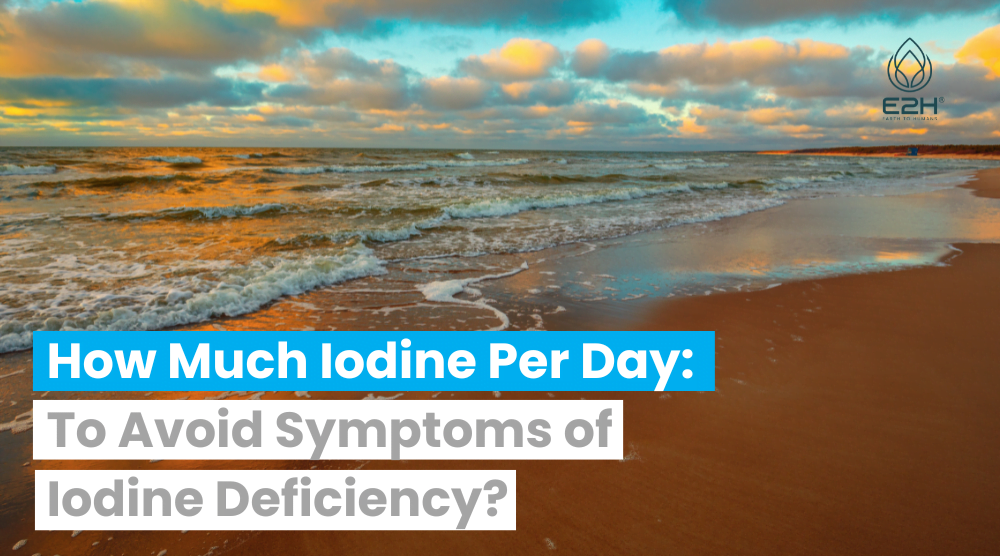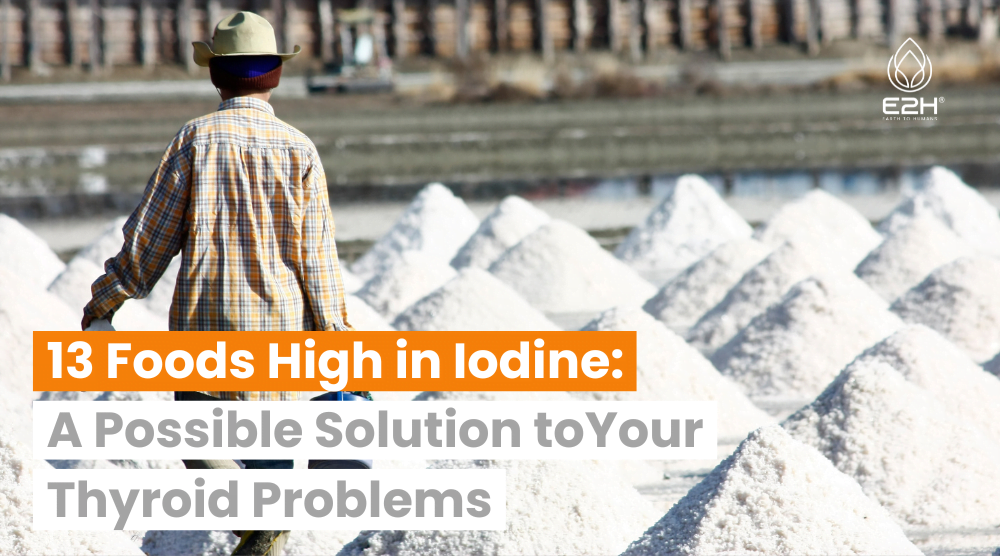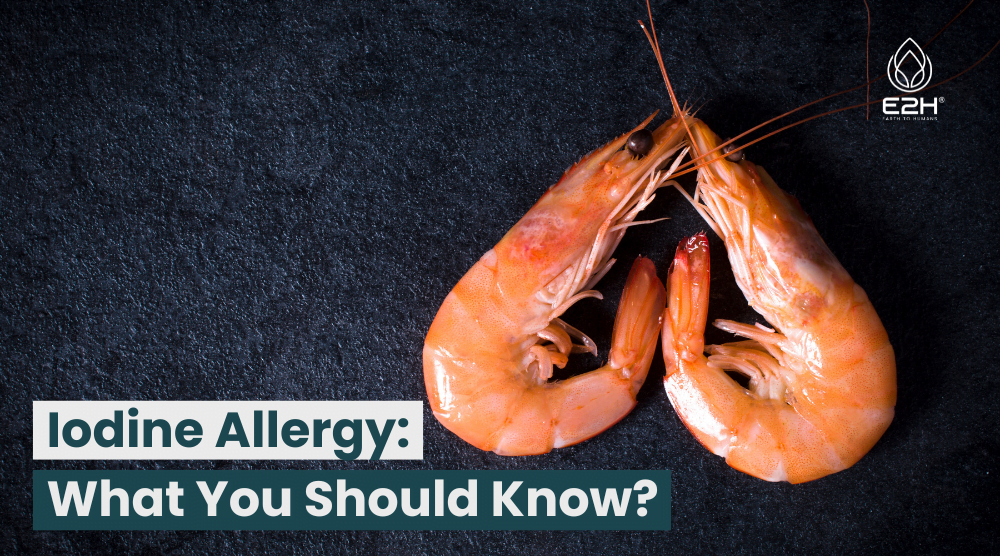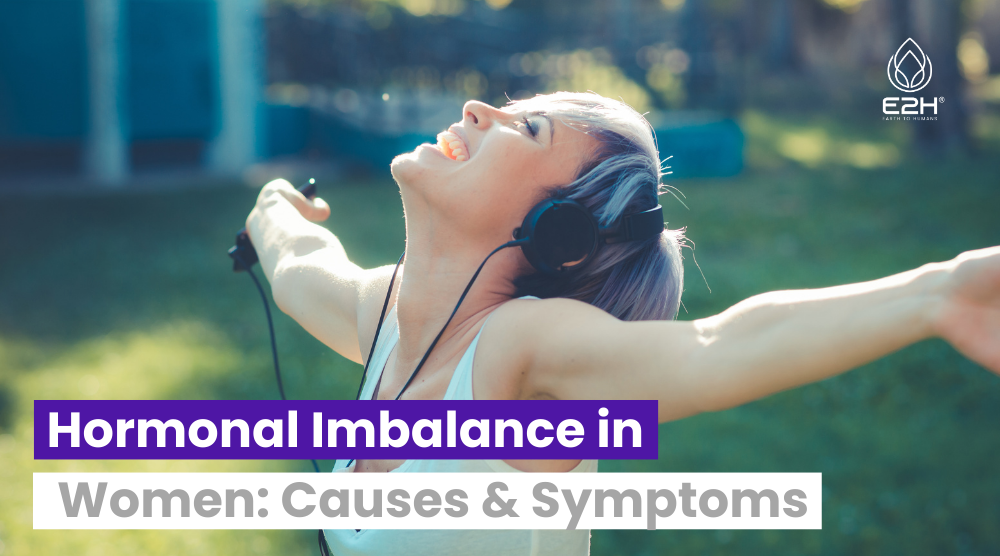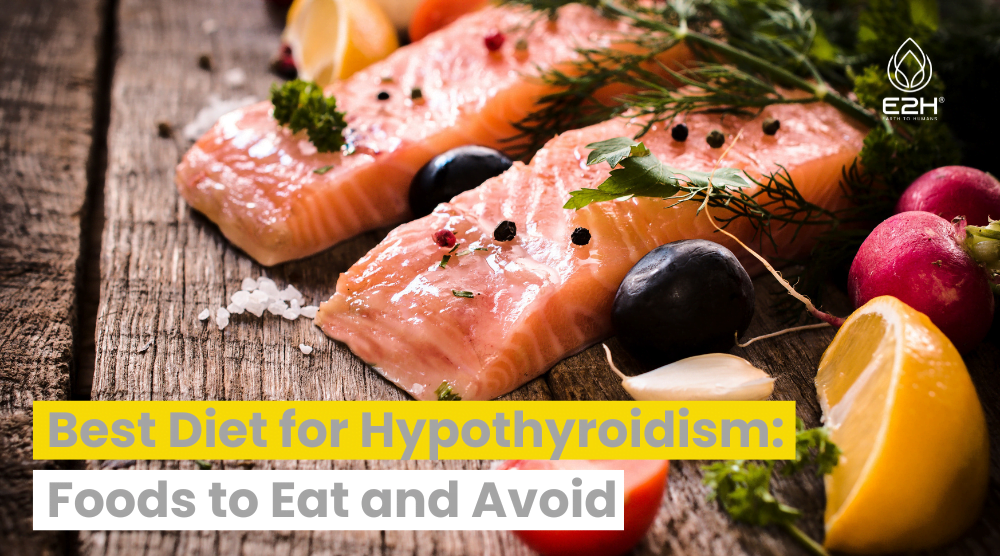How Much Iodine Per Day: The recommended daily intake of iodine for adults is about 150 micrograms (mcg) to avoid symptoms of iodine deficiency and maintain optimal thyroid function.
Your body wouldn’t be capable of functioning correctly without iodine. Therefore, it is a necessary mineral that you must consume daily. Iodine is a trace mineral that is necessary for our health. As the human body cannot make iodine, we must intake iodine by drinking water, using iodized salt and seaweed, taking iodine supplements, and eating foods containing iodine.
Do you know that only 70% of homes have access to iodized salt, which is by far the most important source of dietary iodine? [1]
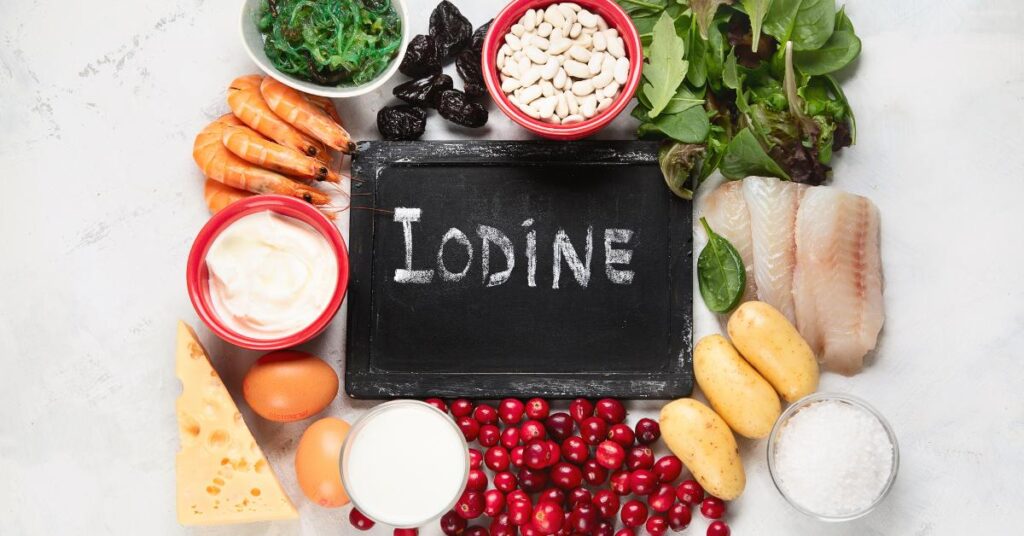
Iodine deficiency is mainly found in nursing and pregnant women. Moreover, American Thyroid Association (ATA) researched the Global scorecard of Iodine Nutrition in 2017. It stated a decrease of almost 50% in dietary intake of iodine [2], and 16% of women were suffering from Iodine intake deficiency [3] because iodine gets secreted in breast milk [4]. Thyroid stimulating hormone TSH level is also low in women compared to men [5], which will affect our upcoming generation.
Finally, after learning tricky information, let’s discuss some more incredible facts about iodine.
What are the Health Benefits?
Iodide has various noteworthy and amazing health benefits, making your body as fit as a fiddle. Don’t ignore them. They can be beneficial in leading your body to a healthy one in the future. So, let’s start discussing how to get you back on your feet again.
First of all, the major benefit of iodine is that it enables the formation of triiodothyronine (T3) and thyroid thyroxine hormone (T4) [6]. We should consume enough Iodide to prevent Low production of thyroid hormone.
Furthermore, the following mentioned Health benefits of Iodide can help your body to feel on top of the world, which include:
Healthy Growth Throughout Pregnancy
Iodine is necessary for pregnant women because it increases the Brain IQ of newborns’ which leads to healthy brain development.
According to data collected in 2018, newborn babies delivered from females who do not obtain adequate levels of iodine levels throughout pregnancy have a higher risk of suffering from poor brain development and lesser Intelligence levels than babies born with proper levels of Iodide from their mothers [7].
Decrease in risk of Goiters
An enlarged thyroid, commonly known as goiter, is a thyroid problem that can form due to an accident, hereditary condition, or even cancer. Iodine intake can benefit in preventing the growth of goiters related to diet.
To cure this, you must intake foods high in Iodine levels and Iodine Supplements [9].
Treats fibrocystic breast disease.
A non-cancerous illness called fibrocystic breast disease results in painful breast cysts. Although it mainly affects women in their reproductive years, some may also experience it after menopause. It has been observed that this disease is particularly common in women who have thyroid disease. Therefore, taking enough iodine can reduce your risk of having this disease.
Remedy for Treating Thyroid Cancer
You will probably wonder how iodine can treat such a severe disease. Well, it definitely can. Thyroid cancer patients may benefit from radioactive iodine treatment. The iodine you consume is almost entirely absorbed by your thyroid[9]. Those Thyroid cancer-causing cells are destroyed by radioactive iodine exposure.
What are the Symptoms of Low Iodine?
According to the American thyroid association, you should consume enough iodine daily to prevent low thyroid hormone production.
Here are some common symptoms associated with low iodine levels in the body.
Hair Loss
Hair loss, also called alopecia, indicates that someone may be deficient in iodine. When a person takes less iodine in their diet, the hair cells immediately stop growing due to a lack of thyroid hormones [10].
Increase in Weight
It’s essential to remember that weight gain isn’t necessarily an indication of iodine insufficiency, known as hypothyroidism. It could be a symptom if there is no other explanation for the weight increase, such as not exercising properly and consuming more calories than necessary[11] [12].
Dry skin
Thyroid hormones greatly help cellular regeneration. The deficiency of Iodine levels can lead to an accumulation of dead skin cells, occasionally producing itchy and dry skin.

Slow level of heartbeat
You can also experience a slow heart rate due to underactive thyroid, which happens in cases of iodine deficiency. In severe cases, heart failure can also occur. Therefore, you must consult a doctor before iodine deficiency causes permanent damage to your heart.
Struggling to remember things
You have come this far. Now you must know that iodine deficiency can help mental development.
The 2014 research study discovered that individuals with low thyroid hormone levels have smaller nervous systems. Moreover, the brain area that keeps the memory record is also underdeveloped in iodine deficiency. Therefore, people with iodine deficiency face difficulty remembering things [13].
Suppose you want to become a quick and proficient, and unique learner. So, you must start intaking iodine according to the daily requirement.
How Much iodine per day?
For best and most effective results, iodine should not be taken before breakfast, mainly when your stomach is empty.
The National Institutes of Health (NIH) recommends the following daily eating amounts based on age to lower your risk for iodine deficiency that are mentioned down below in micrograms(mcg) [14]:
Age Groups Recommended Daily Intake
- 0-6 months 110 mcg
- Newborns between 7-12 months old 130 mcg
- Young ones between 1-8 years old 90 mcg
- Children between 9-13 years old 120 mcg
- Teenagers and adults between 14-18 years old 150 mcg
- Pregnant females 220 mcg
- Women who breastfeed 290 mcg
As you have seen, the above table demonstrates recommended Iodine levels for different groups of ages. Please make sure your adequate iodine intake is according to recommended guidelines. Otherwise, it can lead to iodine-induced hyperthyroidism, weight gain, thyroid dysfunction, and chronic iodine deficiency.
Is there Enough Iodine in your diet?
Most bread and fortified foods containing Cereals are eaten in many households for breakfast. Therefore, if you love yourself enough, you must be conscious of adequate iodine intake by taking care of your supplemental iodine.
The amount of iodine is low in fortified food, which includes cereals and bread.
People who struggle to get enough iodine are:
- A pregnant woman and a nursing mother need to get more iodine levels.
- A person who eats local cuisine and resides in iodine-deficient soil regions experiences iodine deficiency. This is because these soils produce low-iodine crops.
- Mountains like the Himalayan region, Pyrenees, and the Alpine, along with river basins in the South and Southwest side of Asia, are among the geographical locations with the least iodine-rich soil. As a result, people living there do not get enough levels of iodine in their diet. So, they must carefully take one tablet of Iodine supplement daily to meet the daily intake level of iodine.
- Moreover, even the people who consume little to no chicken, beef, and fish or who eat a vegan diet suffer from a deficiency of iodine.
- Among the most acceptable sources of iodine are fish and dairy products. However, people who consume these items in small amounts or not at all may need more iodine.
What’s the lesson here? You better start taking liquid iodine supplements and using iodized salt in your daily intake before it’s too late. But, it says, better late than never.
How much iodine is toxic?
Excess Iodine intake can be harmful and toxic to your health. So, you must be aware of the recommended and toxic iodine levels. Now, as you know the correct amount of iodine intake, try to eat an adequate amount for the best fit results. Use a liquid iodine supplement from a certified source.
Consuming iodine higher than the tolerable upper intake level can harm your body and lead to weight gain, underactive thyroid, dry and itchy skin, iodine-induced hyperthyroidism, and thyroid cancer.
What Foods are rich in Iodine?
Iodine is mainly found in animal foods, seafood, and dairy products. Fortified food, including cereals, bread, and canned foods, also contains a significant amount of iodine.
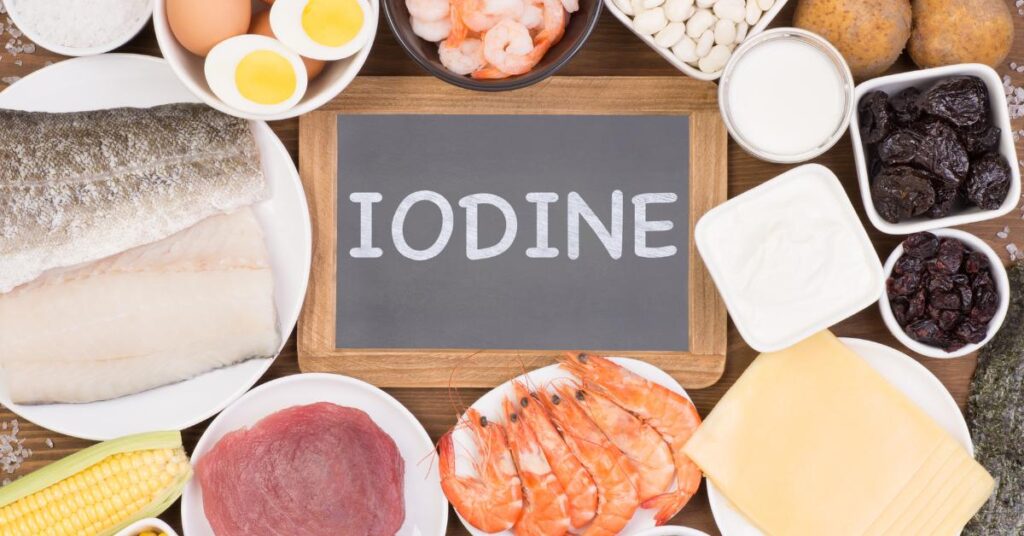
As an adult, you should intake 0.5g of iodine in your daily diet. So, to meet the recommended dietary allowance, the American Thyroid Association and the National Institutes of Health (NIH) recommend taking a sufficient amount of iodine from the following food:
- Iodine Iodized Salt as a Table salt
seaweed intake
- Seafood, including fish, shrimps, and shellfish
- Beef liver or other organ meat
- Dairy products, including milk, cheese, and yogurt
- Chicken
- Eggs
- Infant formulas
- Prunes
Iodized Salt
A research study claims that today, around 90% of the United States population is aware of and has access to Iodized salt [15].
Iodized salt, also known as Table salt, contains an adequate amount of iodine. As a result, iodized salt comes with significant benefits for your health.
Iodized salt is mainly found in Himalayan pink salt, sea salt, and kosher salt. To avoid hair loss, weight gain, and dry skin, you should use iodized salt in your daily routine cooked food and avoid using Canned food, which contains significantly less iodine.
Natural Foods
Choosing Natural foods over junk food is a significant sign of self-love. Let’s start consuming natural food that contains an adequate amount of iodine.
Natural food that is a good source of iodine involves seaweed. Seaweed contains significant amounts of iodine, especially nori, wakame, kelp, and kombu.
Dairy products, specifically egg yolk. Large egg yolk contains almost 26 mcg of Iodine level.
Seafood is also a significant source of iodine. Moreover, cod is generally high in iodine. It contains 0.518 g of iodine.
Above mentioned Iodized Natural food content levels are According to Food Drug Association (FDA), ODS-NIH, and USDA data [16].
Fortified Foods
Fortified food is food that has additional nutrients or nutrients that are not naturally present added to it. Fortification of Iodine is also done in a variety of food products.
Severe Iodine deficiency disorder and less brain development affected 1.9 billion of the world’s population. The overall number is also increasing, and authorities are taking important measures to deal with iodine deficiency. Therefore, fortifying general food items such as bread, cereals, salt, beverages, and seasoning will lessen this colossal ratio.
Can You Eat Kelp for Iodine deficiency?
Kelp is a type of seaweed that is rich in iodine. According to the National Institute of Health (NIH), kelp contains 158 mcg of iodine. Therefore, kelp increases energy levels and improves mental development by providing enough iodine to your body.
Kelp contains antioxidants such as Flavonoids and Carotenoids that help your body prevent stomach pain, fight against diseases, lose weight, and reduce the risk of thyroid cancer [17].
Are there any side effects of sea kelp?
Kelp is full of iodine, so overeating kelp can lead to abnormal thyroid function. Kelp is also composed of harmful metals, for example, lead, cadmium, and aluminum. So, you better be conscious and try to eat kelp in restricted dosages only after the positive advice of your healthcare provider.
What are the alternatives to kelp?
The best substitutes for kelp are mainly dried mushrooms, sea lettuce, and hijiki seaweed.
Flavor alternatives for kelp mainly include dried mushrooms and dashi.
Kelp seasoning alternatives are soya sauce, monosodium glutamate, and fish sauce.
How to know if you need iodine supplements?
Have you noticed an unhealthy weight gain during the last few months? or your body starts feeling low, lazy, and weak? It is also possible for you to experience cold intolerance or hair fall. All these are signs of iodine deficiency. If you are experiencing any of these signs that are not improving after general medications or lifestyle changes, it’s time to consult a doctor who can prescribe you liquid iodine supplements.
Moreover, if you are facing an issue in learning things and have a slow memory, try intaking iodine as your daily supplemental requirement.
Best time to take iodine supplements
You are right on time when you preferably take your iodine supplements after a meal with water or milk. Otherwise, it can upset your stomach. The solution to avoid abdominal discomfort is taking liquid iodine supplements, which are gut-friendly and provides better absorption.
What happens when iodine is too high?
Anything which is consumed in excessive amounts can be toxic to your body. Excessive iodine intake can lead to severe health issues, mainly involving thyroid disease [18].
General Symptoms of Iodine toxicity
A small quantity of iodine which is 90 to 290 mcg, is required for the body in different age groups. Large dosages can be harmful. Children are more likely to get iodine toxicity if supplements are consumed in toxic amounts.
General symptoms of Iodine toxicity involve:
Production of Saliva
Metallic aftertaste
Mouth, throat, and stomach pain
Itchy skin
Swelling of gums and teeth
Appetite loss
Effect of too much iodine on the thyroid
Too much iodine can positively or negatively impact the thyroid gland. For example, iodine toxicity can lead to under-functioning or over-functioning thyroid glands. The mechanism of both phenomena is beyond the understanding of the common man. However, you should be conscious while taking iodine supplements.
What diseases are caused by too much iodine?
Taking too much iodine can lead your body to abnormal thyroid function, causing the following severe diseases:
Goiter
Hyperthyroidism
Hashimoto’s thyroiditis disease
How to Get Rid of Too Much iodine?
People who consume too much iodine are instructed to use table salt, which does not comprise iodine, and cut out on iodine-rich foods like shellfish, kelp, yogurt, milk, and Iodine rich dietary supplements.
If you are a patient suffering from hyperthyroidism, you must avoid consuming too much iodine. Keeping your body healthy is a unique form of self-love. So, you must get rid of the following mentioned foods:
- Iodine iodized salt
- Kelp
- Cheese and yogurt
- Egg yolk
- Fish, shrimps, and shellfish
- Iodine-fortified foods
- Iodide supplements
Other uses of Iodine
Iodine can be considered a valuable element for our body as it regenerates even lower layers of our human skin, hair, and nails. In addition, iodine is better at regulating our hormones. It even works as the best check-in for treating acne breakouts.
Treat Infections
Iodine is a beneficiary element for our body’s health because it treats some infections in the most unpredictable and unique ways. Iodine helps the body produce thyroid hormones that keep the human immune system healthy. In the meantime, a healthy immune system helps the body fight viruses, bacteria, and other pathogens that can cause infections.
Topical iodine solutions are also used to clean wounds and kill germs. Applying a povidone-iodine solution on wounds can prevent the formation of ulcers.
Protection Against Radiation
Iodine can help in protecting our bodies from radiation. It works as a ‘Magic Bullet’ during radiation emergencies. For example, large quantities of radioiodine might be released into the atmosphere if a radiation emergency occurs at a nuclear power facility. Iodine guards against damage caused to your thyroid gland when you consume radioiodine
Disinfect water
Drinkable water is purified with iodine by adding five drops of 2% Tincture Iodine to one liter of water. Adding iodine deliberately kills bacteria, protozoa, and viruses present in water.
So, it concludes that iodine is one of the best disinfectants to purify water.
FAQs
What is the recommended daily intake of iodine?
The recommended daily intake of iodine for adults is approximately 150 micrograms (mcg) to maintain proper thyroid function and prevent iodine deficiency.
Are there different iodine requirements for different age groups?
Yes, the iodine requirements vary by age. For example, infants require less iodine (90-120 mcg), children (1-8 years) need 90 mcg, and adolescents (9-18 years) should aim for 120 mcg.
Are there any factors that can increase iodine requirements?
Pregnancy and breastfeeding increase iodine needs. Pregnant women should aim for 220 mcg, and breastfeeding women require 290 mcg per day to support the development and growth of their babies.
Can I get enough iodine from my diet alone?
In most cases, a well-balanced diet that includes iodine-rich foods like seafood, dairy products, and eggs can provide sufficient iodine. However, in some cases, supplements may be recommended under medical supervision.
Summary
Health professionals consider Iodine the best dietary element as it treats goiters and other thyroid issues, including hyperthyroidism and hypothyroidism.
So, if you are experiencing any of the signs or symptoms of iodine deficiency, try liquid iodine supplements this time to ensure optimal health for your body.
References
1. Pearce EN, Andersson M, Zimmermann MB. Global Iodine Nutrition: Where Do We Stand in 2013? Thyroid. 2022 Oct 3;23(5):523–8.
2. Caldwell KL, Jones R, Hollowell JG. Urinary Iodine Concentration: United States National Health and Nutrition Examination Survey 2001–2002. Thyroid. 2022 Oct 3;15(7):692–9.
3. Blount BC, Pirkle JL, Osterloh JD, Valentin-Blasini L, Caldwell KL. Urinary perchlorate and thyroid hormone levels in adolescent and adult men and women living in the United States. Environmental health perspectives. 2022 Oct 3;114(12):1865–71.
4. Trumbo P, Yates AA, Schlicker S, Poos M. Dietary reference intakes: vitamin A, vitamin K, arsenic, boron, chromium, copper, iodine, iron, manganese, molybdenum, nickel, silicon, vanadium, and zinc. Journal of the American Dietetic Association. 2022 Oct 3;101(3):294–301.
5. Zimmermann M, Trumbo PR. Iodine. Advances in Nutrition. 2022 Oct 3;4(2):262–4.
6. George T Griffing SLL MD, Ph.D. Iodine Deficiency: Practice Essentials, Pathophysiology, Epidemiology [Internet]. Medscape.com. 2022. Available from: https://emedicine.medscape.com/article/122714-overview
7. Health Benefits of Iodine [Internet]. WebMD. 2022. Available from: https://www.webmd.com/diet/health-benefits-iodine#1
8. Cherney K. Iodine Uses Benefits, Side Effects, Recommendations, and More [Internet]. Healthline. 2022. Available from: https://www.healthline.com/health/iodine-uses#uses
9. Thyroid cancer – Treatment [Internet]. NHS.uk. 2022. Available from: https://www.nhs.uk/conditions/thyroid-cancer/treatment/#:~:text=The%20main%20treatments%20are%3A
10. Carissa Stephens, R.N., CCRN, CPN. 11 iodine deficiency signs [Internet]. www.medicalnewstoday.com. 2022. Available from: https://www.medicalnewstoday.com/articles/320891#signs-of-deficiency
11. Yvette Brazier NB R.D., L.D. Calories: Recommended intake, burning calories, tips, and daily needs [Internet]. www.medicalnewstoday.com. 2022. Available from: https://www.medicalnewstoday.com/articles/245588
12. Mayo Clinic. Hypothyroidism – Symptoms, and causes [Internet]. Mayo Clinic. 2022. Available from: https://www.mayoclinic.org/diseases-conditions/hypothyroidism/symptoms-causes/syc-20350284
13. Cooke GE, Mullally S, Correia N, O’Mara SM, Gibney J. Hippocampal Volume Is Decreased in Adults with Hypothyroidism. Thyroid. 2022 Oct 3;24(3):433–40.
14. National Institutes of Health. Office of Dietary Supplements – Iodine [Internet]. Nih.gov. 2022. Available from: https://ods.od.nih.gov/factsheets/Iodine-Consumer/
15. Leung A, Braverman L, Pearce E. History of U.S. Iodine Fortification and Supplementation. Nutrients. 2022 Oct 3;4(11):1740–6.
16. Iodine: USDA ARS [Internet]. www.ars.usda.gov. 2022. Available from: https://www.ars.usda.gov/northeast-area/beltsville-md-bhnrc/beltsville-human-nutrition-research-center/methods-and-application-of-food-composition-laboratory/mafcl-site-pages/iodine/
17. Kristin Buettner AABs PhD. Kelp Benefits: Boost Your Health with Seaweed [Internet]. Healthline. 2022. Available from: https://www.healthline.com/health/food-nutrition/benefits-of-kelp#nutrition
18. Farebrother J, Zimmermann MB, Andersson M. Excess iodine intake: sources, assessment, and effects on thyroid function. Annals of the New York Academy of Sciences. 2022 Oct 3;1446(1).
